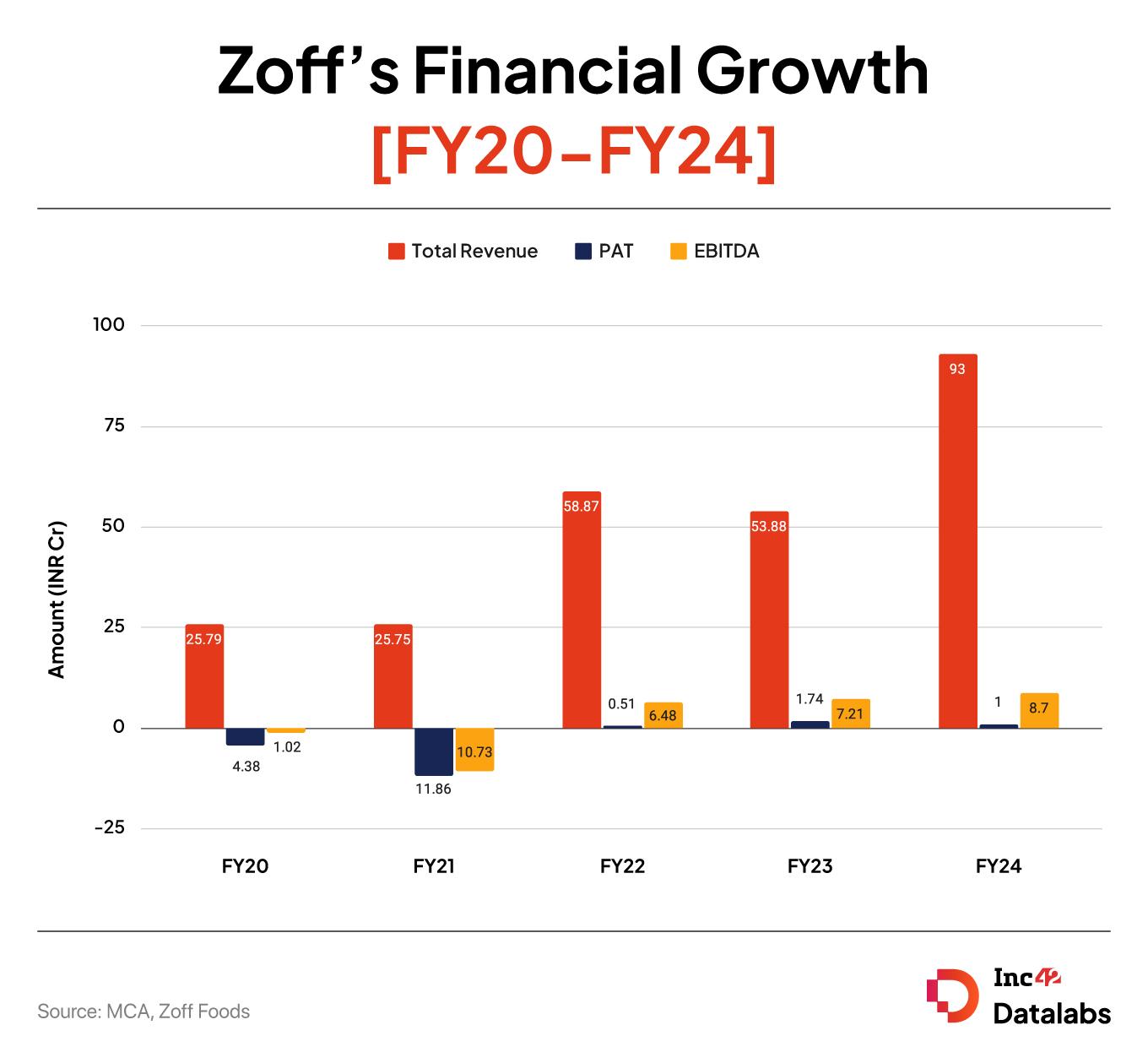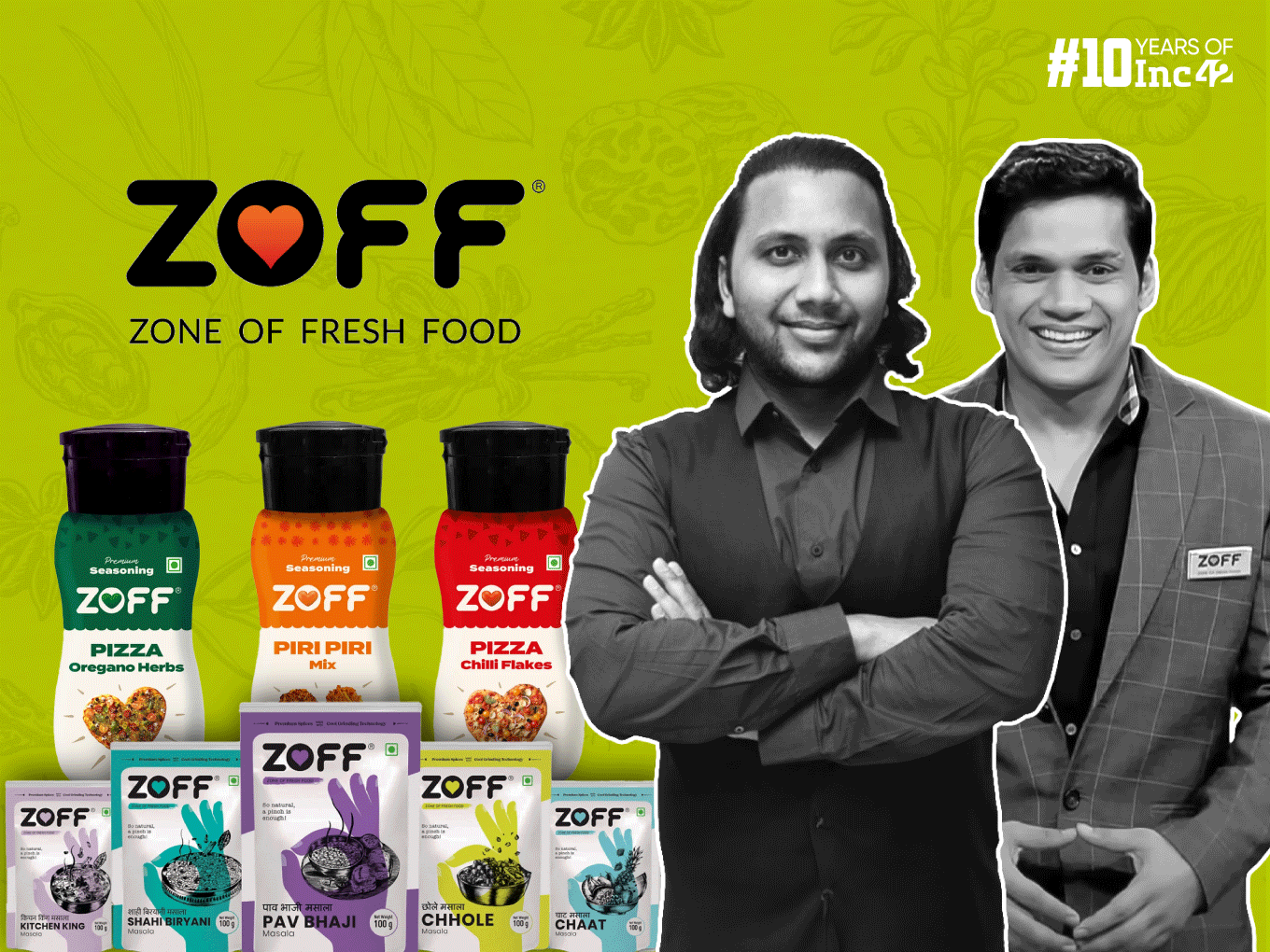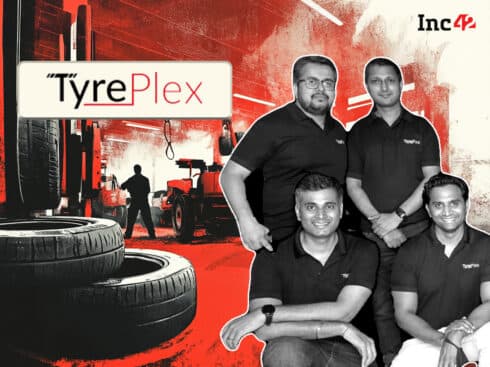Akash Agrawal and his sibling Ashish decided to disrupt India’s ‘spice story’ with a dash of new technology and launched in 2018 the direct-to-consumer (D2C) spice brand Zoff (Zone Of Fresh Food)
Zoff posted a net profit of INR 1 Cr against the INR 11.86 Cr loss in FY21. By the end of the current fiscal, Zoff aims to clock INR 170 Cr+ in revenue, with a 60-70% rise in repeat business
Currently, 45% of Zoff’s business comes from whole spices, and it aims to emerge as a leading player by 2030
As the world’s cravings for everyday and exotic spices grew since antiquity and extended beyond the Middle Ages, Eurasian trade routes like the fabled Silk Road emerged and iconic explorers like Vasco da Gama put India on the global spice map. The country’s spice legacy has continued and it sells spice and spice-related products to nearly 180 countries. India’s exports in this sector amounted to 15.4 lakh tonnes and reached an all-time high of $4.5 Bn in FY24.
When Akash Agrawal, with an MBA in marketing, ran his family’s steel business in Raipur during 2010-2015, he was unaware how the global demand for healthy spices and seasonings would drive the Indian market’s upward trajectory. He was, however, exploring promising sectors to launch his startup.
“The steel industry is too structured, governed by too many regulations. But I wanted to do things differently and create a powerful brand. You cannot do that in a family business. There are norms and set patterns to follow,” he said.
His first startup was CheckedIn, a location-based social networking app designed to help people discover like-minded individuals nearby. But his first attempt at entrepreneurship did not go well and he lost INR 1 Cr within two years. After the initial debacle, he had two options: Rejoining the family business or zeroing in on the right business to fulfil his ambition and create a noteworthy brand.
Being the gutsy risk-taker he has always been, the choice was evident. After thorough research and careful deliberation, Akash and his sibling Ashish decided to disrupt India’s ‘spice story’ with a dash of new technology and launched in 2018 the direct-to-consumer (D2C) spice brand Zoff (Zone Of Fresh Food), specialising in ground, blended and whole spice categories, as well as dry fruits.
The Ingredients That Built Zoff’s Unique Spice Story
The ‘timeless’ appeal of Indian spices across cultures, cuisines and culinary arts and the subsequent growth of the genre irresistibly drew the Agrawal brothers. Given the widespread use of single-origin products, including fundamental assortments favoured by home cooks and exotic blends embraced by HoReCa chefs – the branded spices segment has emerged as the most attractive within the food space since the Covid-19 pandemic. In fact, out of the top 20 Indian food companies in 2021, five were spice companies, and their valuations are expected to be up six to seven times by 2030, per an Avendus Capital report.
As people love local/regional flavours, homegrown incumbents continue to dominate this space, making things tough for new entrants like Zoff. Nevertheless, the Agrawals managed to spot many critical areas that would help them wrest a competitive edge.
“Let us start with the whole spice market. If you think of 2047 (a landmark year of sorts as the Indian government claims the culmination of Viksit Bharat by that time), when most Indian consumers opt for ready-to-use packaged spices, where will this market go? The genesis of Zoff Foods lies in that clarity, that understanding of forward-thinking strategy needs and technology requirements,” said Akash.
To spearhead its products past storied players (think Tata Sampann, Patanjali and their ilk, and you know its competition), Zoff has adopted modern technology such as cold grinding to retain the flavour and ingredient quality (oils and vitamins) found in raw spices and well-layered Ziplock packaging to keep the moisture intact and the spices fresh for a long time (more on its spicetech later).
The startup runs a fully automated manufacturing unit and a 10K sq. ft temperature-controlled warehouse in Raipur and sources premium-quality spices directly from their regions of origin to ensure the best crop conditions. It strictly adheres to FSSAI standards for product quality and lab-tests the incoming stock in-house so that ingredients meeting the highest quality benchmarks are processed.
“Our state-of-the-art, automated plant minimises human intervention, underlining our dedication to delivering safe and superior spice products,” said Akash.
Zoff claimed a gross revenue of INR 93 Cr in FY24, nearly a 4x jump from INR 25.79 Cr in FY20, a year that marked its entry into the ecommerce space after its distribution pivot from general trade. It also posted a net profit of INR 1 Cr against the INR 11.86 Cr loss in FY21. By the end of the current fiscal, Zoff aims to clock INR 170 Cr+ in revenue, with a 60-70% rise in repeat business. It will also introduce new SKUs such as flavoured dry fruits and gifting options.

How Zoff’s Tech Stack Helped Break The ‘Legacy’ Barrier
When a D2C brand enters a market teeming with legacy players, it is bound to face the inevitable question: Do you think you can survive? As for the spice segment, where brand loyalty has been paramount over the years (think of Cookme, a brand which was launched in 1846 and is still doing a roaring business), this throws a spanner in the works of onboarding and retaining customers.
Akash remains undaunted, arguing that the dominance of established brands underscores a massive opportunity for new players keen to disrupt the existing market. A rise in the number of new entrants will help expand the market, get it more organised in terms of value and volume and usher in more innovative blends.
The Avendus study also supports this outlook. It is estimated that the organised branded spice market will reach INR 50K Cr by 2025 and blended spices will have a 35% market share by then.
When asked about breaking the ‘legacy’ barrier and creating a cult brand, Akash talked less about the exotic flavours that Zoff might be experimenting with and focussed more on the business plans and practicalities uppermost in his mind. For instance, the key to acquiring customers, he says, is all about finding the market gaps (it can be quality, convenience or something else), creating the right brand positioning and constantly improving one’s strategy.
“We realised that legacy brands are reluctant to change. They are somewhat convinced that the status quo will persist. That’s where we saw the opportunity and seized it. Nothing innovative was happening in the spice market and we decided to change that,” he said.
Since its inception, the D2C spice brand has pioneered innovative strategies to bring fresh, high-quality spices to the market. Unlike most brands, which still offer single-use sachets and large packs, requiring additional containers for storage after the packets are opened, Zoff provides Ziplock pouches to retain freshness and ensure convenience.
“Spices should be used, sealed and stored anywhere without hassles. That’s how we have developed our products,” said Akash.
During their initial research, the founders also tracked another critical issue plaguing traditional spice companies – the use of hammer mills for spice grinding. The heat generated during that process can damage the output quality, melt spices or spoil intricate designer blends. Therefore, Zoff introduced a cool grinding technology that uses air to break whole spices into small particles before grinding, thus minimising heat generation and preserving the original flavours. It further ensures fine-to-superfine grinding and high throughput for regrinds.
“Next comes another critical procedure, grading, to be precise. Our grading process for whole spices remains largely manual to ensure quality. For instance, whole cloves are graded and packed as a whole spice while the broken ones are used for grinding,” said Akash.
Of Target Markets & Marketplaces: Zoff Debunked Popular Myths To Stay Ahead
In another significant shift from tradition, Zoff has redefined its target customer base and moved away from a woman-centric approach. Although most companies do it even now, Akash, playing a key role in Zoff’s strategy building, believes that the scenario has changed. The kitchen is no longer the exclusive domain of women. On the contrary, Gen Z and the millennials, aged between 20 and 40, are holding sway and emerging as active decision-makers in their households minus any gender bias.
“These are ground realities and we need to design our products for this new generation. Also, with our ecommerce presence, we can reach this younger demographic much faster,” he said.
Zoff was at another strategic crossroads and required to make a pivotal decision to push its growth drive. Should it bolster its presence by selling on third-party marketplaces or transact exclusively via its proprietary website? Most D2C brands do both to optimise sales, but the spice brand has opted for a differentiated strategy.
It currently offers more than 100 SKUs, but only some of its products are available on ecommerce and quick commerce platforms. While Zoff sells its entire product range via its website, marketplaces only stock frequently purchased items like cumin, amchoor (mango powder) and season specials like sesame seeds during the Makar Sankranti festival in January. This selective availability helps the brand balance the reach and convenience of marketplaces with the control and brand fidelity of direct sales.
“Spices are not the kind of products you can sell and scale from your website,” said Akash. “We need readily available items that people can add to the cart along with other goods. No one will visit a site again and again just to order spices. Hence, we need marketplaces. But when people know the brand and realise it has exclusive, value-added products worth buying, they will come more frequently.”
Ecommerce Helped When General Trade Failed To Deliver
Although ecommerce gained prominence around 2014-2015 and D2C brands emerged as niche players, online grocery was struggling at the time. Even a host of well-funded players like Grofers (now Blinkit), Shadowfax, Peppertap, LocalBanya, Townrush (acquired by Grofers), Paytm Zip, Ola Store and Flipkart’s Nearby were fighting to stay afloat, recalled Akash. That’s the reason why Zoff initially focused on general trade (GT) as a distribution model.
“For two years, we worked on cracking the GT market. We expanded to 20 states but eventually realised that GT was a costly affair. Finally, when Covid-19 struck in 2020, we had to let go of our entire sales team of 350,” he rued.
It was the worst of times. The startup was bootstrapped then. The founders had already invested INR 60 Cr to set up the plant. They also burnt INR 30 Cr while trying to master GT operations. And finally, they had no sales team to bring them business. There was no other way out but to opt for ecommerce.
“That’s when players like BigBasket, Zepto and Grofers revolutionised online grocery with fast, efficient deliveries and typical Q-commerce solutions. We knew it was the right time to enter, so we started selling on Flipkart. Zoff clocked a turnover of INR 2.5 Cr from that business,” said Akash.
In addition, the Agrawals started selling to police and army canteens, which saw an annual footfall of 2 Cr. Their efforts paid off and they closed FY22 with a turnover of INR 50 crore, breaking even with a team of four.
The following fiscal proved even better. Zoff registered on the CRED marketplace in August 2022 and conducted paid sampling, charging only shipping costs and giving away products for free. A similar campaign was done via the website for promotion and profit.
Meanwhile, Zoff founders appeared on Shark Tank in February 2023, where it raised INR 1 Cr from boAT founder Aman Gupta.
“By then, our monthly turnover reached INR 5-6 Cr. We also sold on quick commerce platforms like Blinkit, Swiggy and Zepto and gradually ventured into modern trade (MT) by the end of FY23,” said Akash.
ONDC (Open Network for Digital Commerce), too, is his favourite sales channel. “I am a believer in technology. Even when people wondered what ONDC was all about, we got registered and did business worth INR 1.5 Cr within three months,” he added.
How Zoff Founders View The Recent Spice Ban Row
When asked about the recent spice adulteration controversy, Akash emphasised that the ban on certain spice brands in Singapore, Hong Kong and other countries due to ethylene oxide contamination would have far-reaching implications for the spice industry in India. It may lead to a substantial decline in exports, potentially impacting farmers’ livelihoods and overall industry revenue. The current situation further highlights the critical need for robust quality control measures across the industry.
Essentially, government agencies, regulatory bodies and brands must collaborate to ensure stricter testing procedures throughout the supply chain, from farming practices to final processing and packaging. This effort may involve more stringent guidelines for pesticide use, investing in better storage and transportation to minimise contamination risks and conducting more rigorous testing at various production stages.
Akash also thinks this is an ideal opportunity to focus on organic spices that meet the required safety standards.
“These measures can help reassure consumers, rebuild trust among international buyers, and safeguard the reputation of Indian spices,” he added.
What’s Next For Zoff: More Focus On Whole Spices & HoReCa, A Relook At GT
For most people, flavours and aromas of different kinds regurgitate memories and associations. According to ‘spice masters’, these subtle psychological connections are revived through the taste and smell of spices. But for Akash Agrawal, the palate is more ‘macro’. Nothing inspires him better than the brands which have become synonymous with their categories – Saffola for oil, Kohinoor for rice, or Bisleri for water. However, to achieve that level of recognition, Zoff’s primary focus should be whole spices, he says.
“Whole spices are integral to great cooking and are recommended by dieticians for their health benefits. It is also the largest segment of the unorganised spice market. From black pepper to cumin, from fenugreek to cardamom, whole spices account for nearly 50% of a household’s total spice purchases. Hence, it makes sound business sense to expand there,” said Akash.
Currently, 45% of Zoff’s business comes from whole spices, and it aims to emerge as a leading player by 2030. This segment also provides significant opportunities for scaling up in GT and the HoReCa space. The only glitch is that chefs and purchase managers across HoReCa prefer to work with familiar brands. Until Zoff becomes a well-established name, its products may not be widely accepted or used.
“The scope for multi-level growth is all the more reason to go for general trade once again but on a smaller scale. GT is India’s largest market, accounting for 90% of the business. In fact, in the next four years, general trade and ecommerce will split evenly and grow at the same pace. Therefore, we should tap into GT aggressively,” the founder added.
Zoff is already working towards this goal. In the last financial year, about 15% of its business came from GT, and the startup aims to increase this share to 20-25% in the current fiscal.
But one thing is for sure. Zoff’s founders will not pursue any deal that results in a loss, even if it is the loss of a single rupee. Profitability is paramount and the focus on unit economics will not waver after the harsh lessons they have learnt. It is the mantra they have adopted for continuous success. And it is probably the most profound business strategy to adopt, whether one is running a bootstrapped and pre-revenue garage startup or sitting on a pile of cash and earning profits.
[Edited by Sanghamitra Mandal]




 Fintech
Fintech Travel Tech
Travel Tech Electric Vehicle
Electric Vehicle Health Tech
Health Tech Edtech
Edtech IT
IT Logistics
Logistics Retail
Retail Ecommerce
Ecommerce Startup Ecosystem
Startup Ecosystem Enterprise Tech
Enterprise Tech Clean Tech
Clean Tech Consumer Internet
Consumer Internet Agritech
Agritech






























